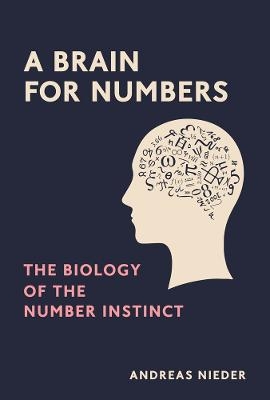
A Brain for Numbers
The Biology of the Number Instinct
Seiten
2019
MIT Press (Verlag)
978-0-262-04278-9 (ISBN)
MIT Press (Verlag)
978-0-262-04278-9 (ISBN)
- Titel z.Zt. nicht lieferbar
- Versandkostenfrei innerhalb Deutschlands
- Auch auf Rechnung
- Verfügbarkeit in der Filiale vor Ort prüfen
- Artikel merken
How our intuitive understanding of numbers is deeply rooted in our biology, traceable through both evolution and development.
Humans' understanding of numbers is intuitive. Infants are able to estimate and calculate even before they learn the words for numbers. How have we come to possess this talent for numbers? In A Brain for Numbers, Andreas Nieder explains how our brains process numbers. He reports that numerical competency is deeply rooted in our biological ancestry; it can be traced through both the evolution of our species and the development of our individual minds. It is not, as it has been traditionally explained, based on our ability to use language. We owe our symbolic mathematical skills to the nonsymbolic numerical abilities that we inherited from our ancestors. The principles of mathematics, Nieder tells us, are reflections of the innate dispositions wired into the brain.
Nieder explores how the workings of the brain give rise to numerical competence, tracing flair for numbers to dedicated "number neurons" in the brain. Drawing on a range of methods including brain imaging techniques, behavioral experiments, and twin studies, he outlines a new, integrated understanding of the talent for numbers. Along the way, he compares the numerical capabilities of humans and animals, and discusses the benefits animals reap from such a capability. He shows how the neurobiological roots of the brain's nonverbal quantification capacity are the evolutionary foundation of more elaborate numerical skills. He discusses how number signs and symbols are represented in the brain; calculation capability and the "neuromythology" of mathematical genius; the "start-up tools" for counting and developmental of dyscalculia (a number disorder analogous to the reading disorder dyslexia); and how the brain processes the abstract concept of zero.
Humans' understanding of numbers is intuitive. Infants are able to estimate and calculate even before they learn the words for numbers. How have we come to possess this talent for numbers? In A Brain for Numbers, Andreas Nieder explains how our brains process numbers. He reports that numerical competency is deeply rooted in our biological ancestry; it can be traced through both the evolution of our species and the development of our individual minds. It is not, as it has been traditionally explained, based on our ability to use language. We owe our symbolic mathematical skills to the nonsymbolic numerical abilities that we inherited from our ancestors. The principles of mathematics, Nieder tells us, are reflections of the innate dispositions wired into the brain.
Nieder explores how the workings of the brain give rise to numerical competence, tracing flair for numbers to dedicated "number neurons" in the brain. Drawing on a range of methods including brain imaging techniques, behavioral experiments, and twin studies, he outlines a new, integrated understanding of the talent for numbers. Along the way, he compares the numerical capabilities of humans and animals, and discusses the benefits animals reap from such a capability. He shows how the neurobiological roots of the brain's nonverbal quantification capacity are the evolutionary foundation of more elaborate numerical skills. He discusses how number signs and symbols are represented in the brain; calculation capability and the "neuromythology" of mathematical genius; the "start-up tools" for counting and developmental of dyscalculia (a number disorder analogous to the reading disorder dyslexia); and how the brain processes the abstract concept of zero.
Andreas Nieder is Professor of Animal Physiology and Director of the Institute of Neurobiology at the University of Tubingen.
| Erscheinungsdatum | 05.11.2019 |
|---|---|
| Reihe/Serie | The MIT Press |
| Zusatzinfo | 50 b&w illus.; 100 Illustrations |
| Sprache | englisch |
| Maße | 152 x 229 mm |
| Themenwelt | Geisteswissenschaften ► Psychologie ► Allgemeine Psychologie |
| Geisteswissenschaften ► Psychologie ► Biopsychologie / Neurowissenschaften | |
| Geisteswissenschaften ► Psychologie ► Sucht / Drogen | |
| Geisteswissenschaften ► Psychologie ► Verhaltenstherapie | |
| Naturwissenschaften ► Biologie ► Humanbiologie | |
| Naturwissenschaften ► Biologie ► Zoologie | |
| ISBN-10 | 0-262-04278-9 / 0262042789 |
| ISBN-13 | 978-0-262-04278-9 / 9780262042789 |
| Zustand | Neuware |
| Informationen gemäß Produktsicherheitsverordnung (GPSR) | |
| Haben Sie eine Frage zum Produkt? |
Mehr entdecken
aus dem Bereich
aus dem Bereich
Techniken der Verhaltenstherapie
Buch (2024)
Julius Beltz GmbH & Co. KG (Verlag)
35,00 €


